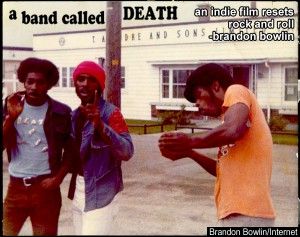 A black punk rock band. In the 70’s. Wait, what?
A black punk rock band. In the 70’s. Wait, what?
That’s right. Around before the Ramones, The Sex Pistols and The Clash, A Band Called Death, made Motown cool and jammed to punk rock before punk rock even existed.
The documentary, A Band Called Death, directed by Jeff Howlett and Mark Covino debuted recently at the 2012 Los Angeles Film Festival and moviegoers were not disappointed.
The movie subliminally denounces the idea of strict forms of “black” and “white” music and proves that for a passionate artist, anything is possible. Could a black punk rock band from Detroit really exist? Most people didn’t think so, which is why the band remained elusive and unknown until passionate record collectors heard one of their little gems nearly thirty years later and realized they had stumbled onto something special. It wasn’t until three decades after their first record that Bobby, David, and Dannis Hackney were recognized for their pioneering of the punk rock musical genre.
Thank you, Hackney brothers.
As with most great artists, Death didn’t really know what they were doing at the time that they were doing it—it was a “what if” experiment that remained a relatively rhetorical question well into the current musical age. What if they dared to create punk music and call themselves Death? Fortunately, now we know the answer. The better question now seems to be what if they hadn’t? That question will remain forever rhetorical.
The music throughout the film removes any doubt about the talent of the band called Death. More than a few times the audience could be found foot-tapping or head-bopping to the recordings of Death, temporarily transported back to Detroit in the 1970’s. What’s awesome about the film is all the other information it gives us beyond the catchy and addictive musical numbers—how was the band created? What happened to them? How influential was the Hackney brother’s family throughout their journey? Most importantly, what are they doing now with their music that still remains undyingly popular? It’s all intertwined and the movie becomes more than a film just about music—it becomes a film about people, their family and their passion. The combination made it impossible to leave the theater without serious respect for the Hackney family and pressing to desire to get your hands on some of their records.
Equally exciting about the experience was the fact that the Hackney brothers themselves were in the audience, watching themselves be forever written into the history books. A short question and answer session following the film allowed the audience a personal connection with the characters they instantly fell in love with on the screen.
It may have taken thirty years, but the Hackney brother’s did it. They proved that maybe it is possible for Death to be the start of something new.


